July 1, 2025 | 19:14 GMT +7
July 1, 2025 | 19:14 GMT +7
Hotline: 0913.378.918
July 1, 2025 | 19:14 GMT +7
Hotline: 0913.378.918
In a presentation with the title "Ecoagriculture: Efficiency and choices of Vietnam’s agriculture - one of the options for Thai Binh’s new direction in agriculture", Dr. Pham Van Hoi, Center for Agricultural Research and Ecological Studies, Vietnam National University of Agriculture (VNUA), said: "Ecoagriculture must be seen as an option to change current, chemically intensive agriculture".
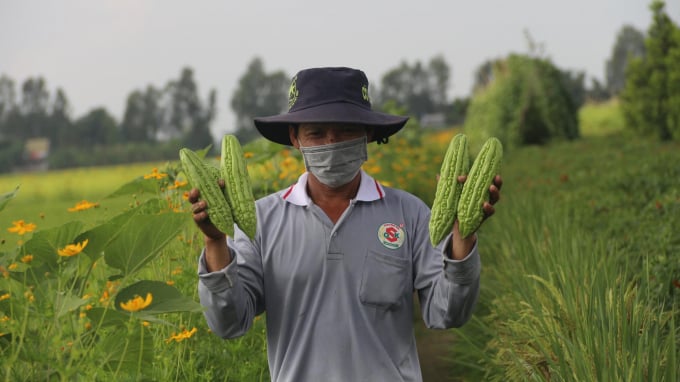
Organic farming models help farmers reduce input costs and improve economic efficiency. Photo: TL.
In the early years of the 21st century, we have witnessed a series of environmental catastrophes, epidemics, climate change and resource degradation. The number of people falling into poverty, lacking clean water and sanitation, and suffering from crop disease and environmental risks are in constant increase. For the poor, technological advances seem to only force them to struggle more and become miserable than ever.
Intensive agriculture has caused many negative impacts on ecosystems. One thing to note is that when the environment is degraded, the cost of economic development will increase. Farmers will have to simultaneously face the pressure from resource degradation and increased pests followed by additional chemical investment costs. This shows that the quality of the environment and ecological services are decisive for economic development as well as for ensuring the general and long-term welfare of people.
Ecoagriculture can be considered the only option that helps us achieve the goals of adaptation and risk mitigation at the same time.
Ecoagriculture is a production system that depends on, promotes and makes full use of natural processes (e.g. organic decomposition, biological balance, land regeneration, soil nutrition) on the basis of enhancing biodiversity protection.
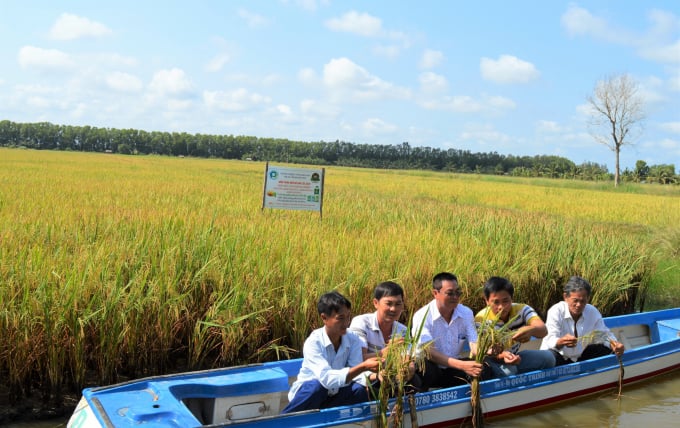
A farming model combining shrimp with organic rice is thriving in the Mekong Delta.
Agricultural systems are designed to be more circular and therefore more efficient (economically, socially and environmentally). Regarding the scale of the farms and the farm production system, the Gret organization (France) researching in South East Asia lists six forms of ecoagriculture including: Integrated Pest Management - Integrated Crop Management (IPM/ICM), agroforestry, integrated agriculture system (VAC, which stands for “Vườn - Ao - Chuồng” in Vietnamese, or “Garden - Pond - Sheds”), System of Rice Intensification (SRI), conservation agriculture, and organic agriculture.
Ecoagriculture not only aims to increase investment efficiency while improving agro-products' quality and people’s income, but also serves as a “green belt” that supports all other activities of the economy and life in general.
The advantages of ecoagriculture
Ecoagriculture has many advantages over chemical-intensive agriculture when facing a ceaseless increase in complexity and amplitude of risks.
A comparison between farmer A applying a maize monoculture and farmer B applying a rice - maize - chicken integrated farming system can be made as an example. In this case farmer B will gain higher independence of food self-sufficiency for the family, higher preference to reuse waste (thus less dependence on chemical or outsourced organic fertilizers), and higher flexibility in risk management (when maize price plummets for example). Another advantage is that farmer B can utilize family labor and other resources more reasonably and efficiently.
Ecoagriculture - An option for Vietnam
Components in the natural ecosystem in general and agriculture in particular interact with each other in a very complicated manner with hundreds or thousands of factors. So far science is yet to make much progress in understanding these impacts.
A study of Costanza et al (1997) identified seventeen services that natural ecosystems provide to humans. To put it simply, these ecological values are the foundation that sustains direct economic benefits from all human economic activities, including agricultural production. As the quality of ecological services declines, the direct economic benefits from agricultural production will follow.
The destruction of ecological services has forced Vietnam to face environmental pollution, resource degradation, and food safety stresses over the past several decades. The only way to repair and restore these ecological services is through the application of ecological solutions in agricultural production.
Ecoagriculture must be seen as an alternative to today's chemically intensive agriculture. Ecoagriculture aims to enhance people’s ability to be creative through adaptation strategies in order to achieve agricultural production with the highest efficiency (considering investment capital) and sustainability (protecting ecological services). This alternative ensures the quality of agro-products as well as the health of producers and consumers in general, increasing production autonomy, national export capacity and the quality of the common living environment for all.
Translated by Samuel Pham
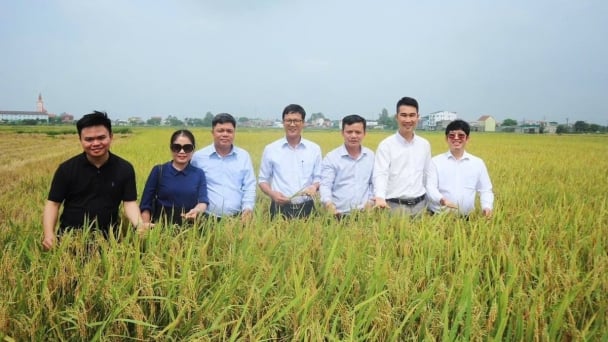
(VAN) The rice cultivation model applying the alternate wetting and drying (AWD) irrigation method has demonstrated significant emission reduction efficiency and has been registered as a carbon credit project.
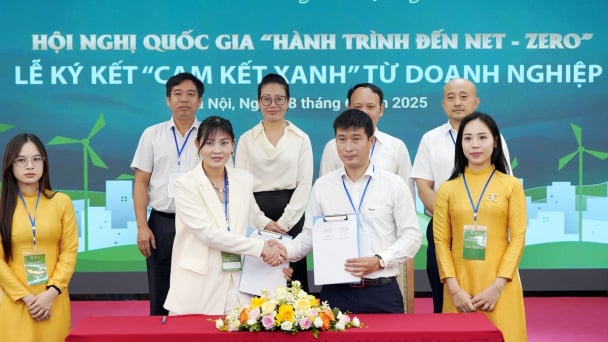
(VAN) The event initiated policy, technical, and financial alignment efforts, which enabled businesses, particularly small and medium-sized enterprises, to proactively transition to low-emission development.
/2025/06/30/0115-3-125736_6.jpg)
(VAN) This is the wish of local governments and pig farmers to establish comprehensive herd immunity, enhance the effectiveness of African Swine Fever (ASF) control, and reduce economic losses.
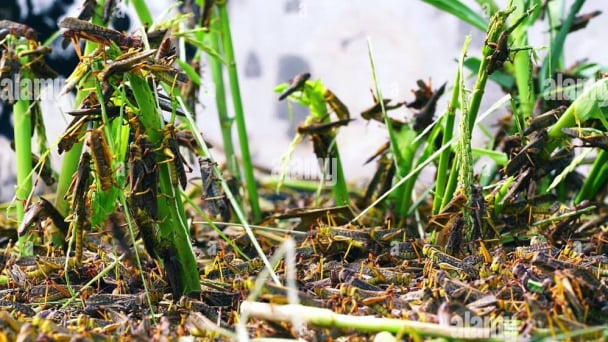
(VAN) A group of Chinese researchers has discovered the biosynthesis and release process of the key pheromone that causes a locust outbreak, making an important contribution to the ecological prevention of locust plagues.
/2025/06/27/4654-2-213900_52.jpg)
(VAN) The Central Annamites Landscape Strategy for the 2025–2030 period sets a comprehensive direction for forest conservation, ecosystem restoration, and sustainable livelihood development.
![Lifting the IUU 'yellow card': [2] Thorough preparation for the EC inspection](https://t.ex-cdn.com/nongnghiepmoitruong.vn/608w/files/huytd/2025/06/27/3109-1-005033_548.jpg)
(VAN) Ahead of the fifth inspection by the EC, Khanh Hoa and Phu Yen have controlled fishing vessels, catch volumes at ports, and VMS equipment to meet the requirements for lifting the IUU 'yellow card.'
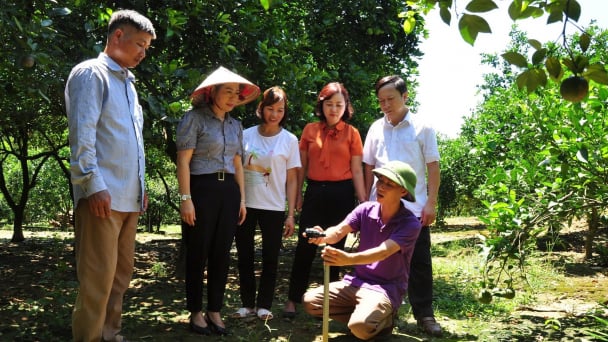
(VAN) Since the implementation of Resolution No. 03 by the People's Council of Tuyen Quang province, 282 organizations and individuals have been supported with advanced, water-saving irrigation systems, covering a total area of 765 hectares.